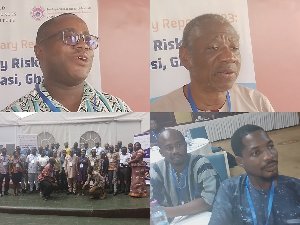The Principal Research Scientist, Building and Road Research Institute at the Council for Scientific and Industrial Research (CSIR), Dr. Williams Ackaah, has revealed that the failure of people to use helmets and comply with other traffic regulations has played a significant role in most of the fatal motor accidents recorded in Ashanti.
According to him, most motorcycle users do not wear helmets, contributing significantly to the number of fatalities recorded in the country every year.
Expressing much concern for users in the Ashanti region, the lead researcher disclosed that it was very worrying that only 36 percent of motorcycle users wear them, compared to Greater Accra, where about 60 percent of users wear helmets.
He further disclosed that, per the regulations, both riders and passengers were supposed to wear helmets. However, research has unveiled that only about 2 percent of passengers on motorbikes wear helmets, adding that the situation is very dangerous.
He has advised both riders and passengers to make the usage of helmets a priority. According to him, helmet usage reduces the chances of death in motor accidents by 42 percent, and it protects people's heads from damages that could eventually lead to death or mentally related issues.
Apart from his worry about failure in helmet usage, Dr. William further expressed concern over the rate at which both car and motor crashes keep killing people. Attributing most of these unfortunate incidents to reckless driving and intentional neglect of traffic regulations, the scholar advised drivers and other motorcycle users to desist from overspeeding, reckless driving, and other irresponsible behaviours that could endanger their lives.
He said it was very worrying that when it comes to the number of gory scenes witnessed in the country, car and motor accidents keep dominating.
He particularly mentioned motor users, indicating that initial records from 2002 had motor fatalities in the country at the bottom. But, per records in recent times from 2021, he said, motor fatalities lead the chart.
He said since 2021 and 2022 most of the people who die from motor accidents do not wear helmets.
Reiterating the need to avoid accidents in the country, Dr. Williams said, numerous accidents bring many unexpected costs such as property damage cost, administrative cost, medical cost, etc. He said it leads to deaths and piled cases in court, and the country also loses a huge part of its GDP to road accidents.
He said all this during a Bloomberg Stakeholders Data Use Workshop at the Golden Bean Hotel in Kumasi. The one-day sensitization program which centered mainly on road crash data and how to stop them was powered by the Bloomberg Initiative for Global Road Safety (BIGRS) in collaboration with the CSIR Building and Road Research Institute. The engagement further enlightened attendees on how to prevent the increasing road accidents in the country, particularly in the Ashanti region.
Participants included stakeholders from the various district assemblies including Presiding Members and engineers, road safety authorities, highway authorities, some selected journalists, etc.
Topics treated included Speeding in Kumasi, Outcomes Data in Kumasi, Helmet Use in Kumasi, and Speed Management Plan in Kumasi, among others.
Other key facilitators who took stakeholders through the various topics included Ing. Francis Afukaar (CSIR- BRRI), Mr. Kingsley Wireko (BIGRS Surveillance Coordinator, KMA), Mr. Mark Tonyemevor (Urban Mobility Analyst, WRI), Ing. Dr. Simon Ntramah (CSIR- BRRI), etc.
On his part, Ing. Francis Afukaar, CSIR- Building and Road Research Institute, gave the purpose of the organization by indicating that they aimed to educate stakeholders on the need to make it a shared responsibility in preventing road accidents in the country, especially in the Ashanti region. He said it was time people protected themselves from bad behaviors which can cause accidents and subsequently bring burdens in society.
Regional News of Sunday, 26 May 2024
Source: Nana Peprah
Most motor accident victims die due to failure to wear helmets, non compliance to traffic regulations - Doctor Williams
Entertainment












